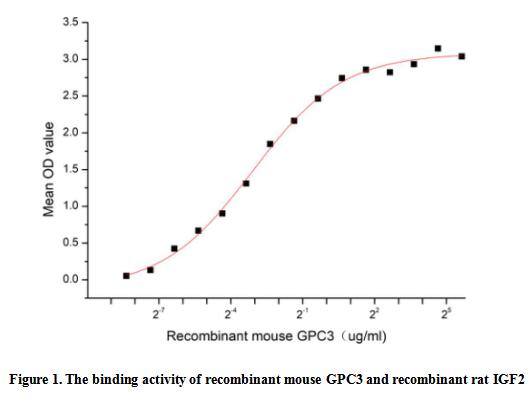Active Glypican 3 (GPC3) 

DGSX; OCI5; SDYS; SGB; SGBS1; MXR7; Glypican Proteoglycan 3; GTR2-2; Intestinal protein OCI-5; Secreted glypican-3
Overview
Properties
- Product No.APA971Mu01
- Organism SpeciesMus musculus (Mouse) Same name, Different species.
- ApplicationsCell culture; Activity Assays.
Research use only - DownloadInstruction Manual
- CategoryTumor immunityInfection immunityDevelopmental science
- Buffer FormulationPBS, pH7.4, containing 0.01% SKL, 5% Trehalose.
- Traits Freeze-dried powder, Purity > 90%
- Isoelectric Point6.4
Sign into your account
Share a new citation as an author
Upload your experimental result
Review

Contact us
Please fill in the blank.
Activity test

Glypican-3 (GPC3), a 70 kDa protein, is a member of the glypican family that attaches to the cell surface by a glycosylphosphatidylinositol anchor, is specifically up-regulated in hepatocellular carcinoma (HCC) although rarely or not expressed in normal liver tissues, making it a perfect diagnostic and treatment target for HCC. GPC3 is also a negative transcriptional regulator and tumor suppressor that inhibits the growth of breast, ovary, and lung cancer cells. It is reported that GPC3 can form a complex with insulin-like growth factor 2 (IGF2), and might thereby modulate IGF2 action. Thus a functional binding ELISA assay was conducted to detect the interaction of recombinant mouse GPC3 and recombinant rat IGF2. Briefly, GPC3 was diluted serially in PBS with 0.01% BSA (pH 7.4). Duplicate samples of 100 μl were then transferred to IGF2-coated microtiter wells and incubated for 1h at 37℃. Wells were washed with PBST and incubated for 1h with anti-GPC3 pAb, then aspirated and washed 3 times. After incubation with HRP labelled secondary antibody for 1h at 37℃, wells were aspirated and washed 5 times. With the addition of substrate solution, wells were incubated 15-25 minutes at 37℃. Finally, add 50 µL stop solution to the wells and read at 450/630 nm immediately. The binding activity of recombinant mouse GPC3 and recombinant rat IGF2 was shown in Figure 1, the EC50 for this effect is 0.12 ug/mL.
Usage
Reconstitute in 10mM PBS (pH7.4) to a concentration of 0.1-1.0 mg/mL. Do not vortex.
Storage
Avoid repeated freeze/thaw cycles. Store at 2-8°C for one month. Aliquot and store at -80°C for 12 months.
Stability
The thermal stability is described by the loss rate. The loss rate was determined by accelerated thermal degradation test, that is, incubate the protein at 37°C for 48h, and no obvious degradation and precipitation were observed. The loss rate is less than 5% within the expiration date under appropriate storage condition.
Increment services
-
 BCA Protein Quantification Kit
BCA Protein Quantification Kit
-
 Molecular Mass Marker for Protein
Molecular Mass Marker for Protein
-
 Monoclonal Antibody Customized Service
Monoclonal Antibody Customized Service
-
 Polyclonal Antibody Customized Service
Polyclonal Antibody Customized Service
-
 Protein Activity Test Experiment Service
Protein Activity Test Experiment Service
-
 Electrophoretic Mobility Shift Assay (EMSA) Experiment Service
Electrophoretic Mobility Shift Assay (EMSA) Experiment Service
-
 Buffer
Buffer
-
 Lentivirus Packaging Experiment Service
Lentivirus Packaging Experiment Service
-
 Adenovirus Packaging Experiment Service
Adenovirus Packaging Experiment Service
-
 Real Time PCR Experimental Service
Real Time PCR Experimental Service
-
 Spike RBD Protein (S-RBD)
Spike RBD Protein (S-RBD)
-
 Protein G
Protein G
-
 Protein A
Protein A
Citations
- Diagnostic Role of Serum Glypican-3 as a Tumor Marker for Hepatocellular Carcinoma Sciencepub:10043238
- Cytotoxic effects of antiglypican-3 against HepG2 cell lineEbscohost: Source
- Can Glypican3 be Diagnostic for Early Hepatocellular Carcinoma among Egyptian Patients?Pubmed: 24460300
- Diagnostic accuracy of serum glypican-3 for hepatocellular carcinoma: A systematic review and meta-analysisPubmed: 24362268
- Diagnostic Role of Serum Glypican-3 as Hepatocellular CarcinomaZolcat: Source
- Role of serum glypican-3 in the diagnosis and differentiation of small hepatocellular carcinoma from hepatitis-C virus cirrhosisScienceDirect: S2090506814000062
- Comparing prothrombin induced by vitamin K absence-II (PIVKA-II) with the oncofetal proteins glypican-3, Alpha feto protein and carcinoembryonic antigen in diagnosing hepatocellular carcinoma among Egyptian patients.Pubmed:24841158
- Evaluation of antiglypican-3 therapy as a promising target for amelioration of hepatic tissue damage in hepatocellular carcinomaPubmed:25449037
- Predictive value of tumor markers in patients with recurrent hepatocellular carcinoma in different vascular invasion patternabstract:abstract4525.shtml
- Glypican-3 level assessed by the enzyme-linked immunosorbent assay is inferior to alpha-fetoprotein level for hepatocellular carcinoma diagnosispmc:articles
- Glypican‐3: A promising biomarker for hepatocellular carcinoma diagnosis and treatmentpubmed:28621802
- Cytotoxic and partial hepatoprotective activity of sodium ascorbate against hepatocellular carcinoma through inhibition of sulfatase-2 andPubmed:29669302
- Development and Validation of a Two-Site Immunoradiometric assay for Glypican-3 in plasma: Implication in Diagnosis of Hepatocellular CarcinomaResearchgate:Source
- Serum Glypican-3, Vascular Endothelial Growth Factor, and Interleukin-6 Levels in Hepatocellular Carcinoma10.5505:tjo.2018.1742
- Elevated plasma glypicans are associated with organ failure in patients with infectionPubmed: 30618011
- VALUE OF SERUM GLYPICAN 3 AS A PREDICTIVE TOOL FOR EARLY DIAGNOSIS OF HEPATOCELLULAR CARCINOMA (HCC)
- Search for Effective Serum Tumor Markers for Early Diagnosis of Hepatocellular Carcinoma Associated with Hepatitis C
- Selenium nanoparticles overcomes sorafenib resistance in thioacetamide induced hepatocellular carcinoma in rats by modulation of mTOR, NF-κB pathways and …Pubmed:35640776







